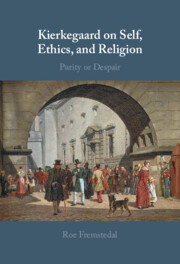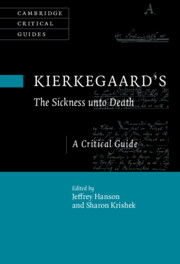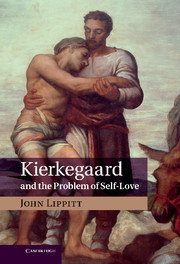Kierkegaard on Self, Ethics, and Religion
Purity or Despair
$99.99 (F)
- Author: Roe Fremstedal, Norwegian University of Science and Technology, Trondheim
- Date Published: February 2022
- availability: Available
- format: Hardback
- isbn: 9781316513767
$
99.99
(F)
Hardback
Other available formats:
Paperback, eBook
Looking for an examination copy?
If you are interested in the title for your course we can consider offering an examination copy. To register your interest please contact [email protected] providing details of the course you are teaching.
-
Many of Søren Kierkegaard's most controversial and influential ideas are more relevant than ever to contemporary debates on ethics, philosophy of religion and selfhood. Kierkegaard develops an original argument according to which wholeheartedness requires both moral and religious commitment. In this book, Roe Fremstedal provides a compelling reconstruction of how Kierkegaard develops wholeheartedness in the context of his views on moral psychology, meta-ethics and the ethics of religious belief. He shows that Kierkegaard's influential account of despair, selfhood, ethics and religion belongs to a larger intellectual context in which German philosophers such as Kant and Fichte play crucial roles. Moreover, Fremstedal makes a solid case for the controversial claim that religion supports ethics, instead of contradicting it. His book offers a novel and comprehensive reading of Kierkegaard, drawing on important sources that are little known.
Read more- Reveals the relevance and importance of Kierkegaard's thought for contemporary debates
- Assesses Kierkegaard's contributions to modern European philosophy and theology
- Includes an authoritative overview of the relevant sources, including some that are little known
- Analyzes Kierkegaard's neglected critique of the influential irrationalist reading of him developed by his contemporary Magnús Eiríksson
- Responds to many of the familiar problems in the Kierkegaard literature by discussing subjectivism, rationality, normative conflict and amoralism
Reviews & endorsements
'Professor Fremstedal conducts a compelling reconstruction of how Kierkegaard develops wholeheartedness based on his views of moral psychology, metaethics, and the ethics of religious belief … This monograph provides unique understanding and reliable resources, tackling some controversial issues, and is a timely reference worthy of being read by researchers interested in the study of Kierkegaard and his outstanding cognitive philosophy on selfhood, ethics, and religion.' Chuandai Qiao, Dialog A Journal of Theology
See more reviews'While this book will serve as an indispensable resource for contemporary Kierkegaard scholarship, it also has something to offer for ongoing conversations about Kant, German Romanticism, Idealism, ethics, religious epistemology, and Kierkegaard's subsequent relevance to these areas. In this way, Fremstedal has done a tremendous service to Kierkegaard scholarship by re-presenting him as a figure worthy of immediate consideration across multiple subdisciplines of philosophical and theological inquiry and scholarship.' Charles Duke, Journal for Continental Philosophy of Religion
‘Fremstedal has a talent for presenting philosophical argumentation with clarity and stunning economy. While this style does not make for easy consumption, it allows Fremstedal to chart an elegantly argued path through a forest of secondary literature. His gift for lapidary summation is complemented by his ear for passages that unite philosophic significance, passionate conviction, and literary force. Whether he is discussing Kierkegaard himself or secondary scholarship, Fremstedal renders gnarly philosophical disputes vivid, thanks to his gift for telling citations in a compelling narrative. A spirit of generosity and fair-mindedness animates Fremstedal’s project from beginning to end, and this, together with his able bridging of predominantly continental and analytic approaches, makes this book particularly thought-provoking.’ Vanessa Rumble, Journal of the History of Philosophy
Customer reviews
Not yet reviewed
Be the first to review
Review was not posted due to profanity
×Product details
- Date Published: February 2022
- format: Hardback
- isbn: 9781316513767
- length: 280 pages
- dimensions: 235 x 158 x 23 mm
- weight: 0.73kg
- availability: Available
Table of Contents
Introduction
Part I. Self, Despair and Wholeheartedness:
1. Selfhood and anthropology
2. Why be moral? The critique of amoralism
3. Moral inescapability: Moral agency and meta-ethics
Part II. Morality, Prudence and Religion:
4. The critique of eudaimonism: Virtue ethics, kantianism and beyond
5. Non-eudaimonistic ethics and religion: Happiness and salvation
6. The 'Teleological suspension of the ethical' and Abraham's sacrifice of Isaac
7. Moralized religion: The identity of the good and the divine
Part III. 'Subjectivity, Inwardness, is Truth':
8. 'Hidden inwardness' and humor: Kantian ethics and religion
9. Subjective truth: 'Kierkegaard's most notorious…claim'
Part IV. Faith and Reason:
10. A leap of faith? The use of lessing, Jacobi and Kant
11. Faith neither absurd nor irrational: The neglected reply to Eiríksson
12. Faith beyond reason: Supra-rationalism and anti-rationalism
13. The ethics of belief: Fideism and pragmatism
Conclusion
References
Index.
Sorry, this resource is locked
Please register or sign in to request access. If you are having problems accessing these resources please email [email protected]
Register Sign in» Proceed
You are now leaving the Cambridge University Press website. Your eBook purchase and download will be completed by our partner www.ebooks.com. Please see the permission section of the www.ebooks.com catalogue page for details of the print & copy limits on our eBooks.
Continue ×Are you sure you want to delete your account?
This cannot be undone.
Thank you for your feedback which will help us improve our service.
If you requested a response, we will make sure to get back to you shortly.
×



